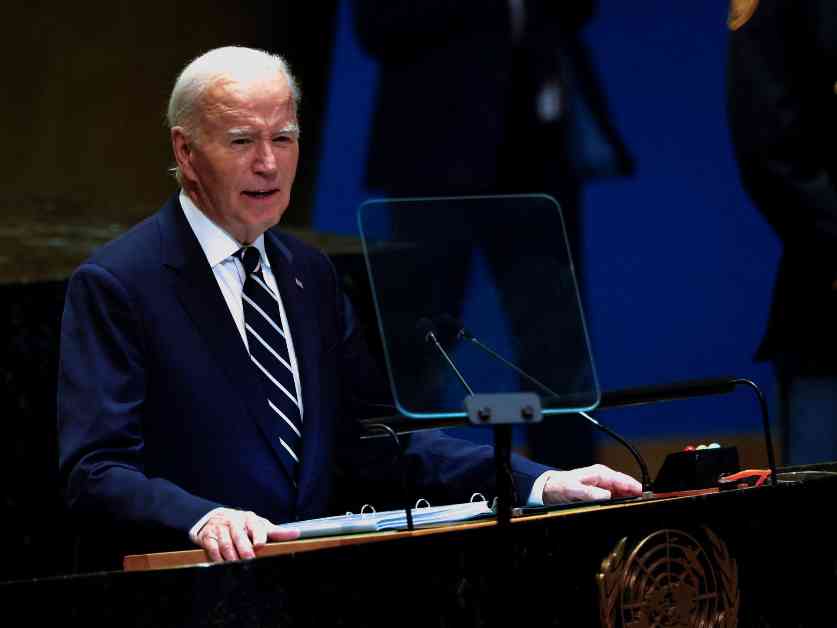United States President Joe Biden has called for de-escalation amid Israel’s recent bombardment of Lebanon, emphasizing the importance of finding a diplomatic solution to prevent a full-scale war in the region. Speaking at the United Nations General Assembly (UNGA), Biden stressed the need for unity and collaboration to address the escalating conflict between Israel and the Lebanese group Hezbollah.
Biden expressed his concerns about the ongoing violence in Lebanon, where Israeli forces have launched a massive bombing campaign resulting in the deaths of hundreds of people, including children. He underscored the urgency of avoiding a full-scale war, stating that it is not in anyone’s interest to see further escalation of the conflict.
The United States has faced criticism for its unwavering support of Israel, despite calls to reconsider its stance as the violence in the region continues to escalate. Biden’s speech at the UNGA reaffirmed his administration’s backing of Israel, drawing both support and criticism for his approach to the situation.
As the death toll in Lebanon continues to rise, with hundreds of casualties reported by the Lebanese Health Ministry, the need for a peaceful resolution to the conflict becomes increasingly urgent. The Israeli military’s continued attacks on Lebanon and the Gaza Strip have raised concerns about the potential for a wider regional conflict, prompting calls for decisive action to prevent further bloodshed.
Biden’s Support for Israel and Ukraine
In addition to addressing the situation in Lebanon, President Biden reiterated his administration’s support for Israel and Ukraine during his UNGA speech. Despite facing criticism for his backing of Israel, Biden emphasized the importance of standing by the country in its efforts to maintain security and stability in the region.
Biden also highlighted the ongoing conflict in Ukraine, where Russia’s invasion has led to significant humanitarian challenges. The United States has provided substantial military and financial aid to Ukraine since the start of the conflict, underscoring its commitment to supporting the country in its struggle for independence and sovereignty.
Criticism and Concerns
While Biden’s speech at the UNGA touched on key issues related to the conflicts in the Middle East and Ukraine, critics have raised concerns about the lack of concrete action to address the escalating violence. Some have questioned the effectiveness of Biden’s approach in promoting peace and stability in the region, particularly in light of the continued attacks on Lebanon and Gaza.
Critics have also pointed to the need for greater diplomatic efforts to de-escalate tensions and prevent further loss of life in the conflict-affected areas. The failure to secure a ceasefire agreement between Israel and Hamas, as well as the lack of progress in addressing the root causes of the conflicts, has raised doubts about the effectiveness of the current approach.
Looking Ahead
As the situation in the Middle East and Ukraine continues to evolve, the international community faces the challenge of finding sustainable solutions to the conflicts. President Biden’s calls for de-escalation and diplomatic engagement serve as a reminder of the importance of dialogue and cooperation in resolving longstanding disputes and preventing further violence.
Moving forward, it will be crucial for world leaders to work together to address the root causes of the conflicts and promote peace and stability in the affected regions. By prioritizing diplomacy and dialogue, the international community can help prevent further escalation of violence and pave the way for a more peaceful and secure future for all.



























